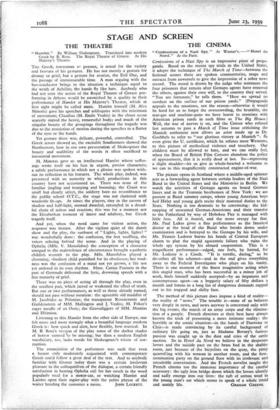THE CINEMA
" Confessions of a Nazi Spy." At Warner's.—" Hotel du Nord." At the Paris.
Confessions of a Nazi Spy is an impressive piece of propa- ganda. Based on the recent spy trials in the United States, it adopts the technique of The March of Time—between the fictional scenes there are spoken commentaries, maps and extracts from newsreels to give the impression of a sober news record. The moral is drawn by the judge who sentences the four prisoners that remain after Gestapo agents have removed the others, against their own will, to the country they served. " You are fortunate," he tells them. " Here we spread no sawdust on the surface of our prison yards." (Propaganda appeals to the emotions, not the reason—otherwise it would be hard for us to forget the overcrowding, the brutality, the tear-gas and machine-guns we have learnt to associate with American prison yards in such films as The Big House.) Well, the war of nerves is on, and the Censor who refused last autumn to pass a March of Time issue criticising the Munich settlement now allows an actor made up as Dr. Goebbels to refer to "our glorious victory at Munich ": fie even gives the U. certificate, which he refuses most Westerns, to this picture of methodical violence and treachery. Our children must be allowed to hate, and we can really feel, when the Board of British Film Censors abandons the policy of appeasement, that it is really dead at last. So—repressing a slight shudder—let us give as whole-hearted a welcome as we can to this magnificently constructed engine-of-war.
The picture opens in Scotland where a middle-aged spinster acts as a forwarding agent between certain leaders of the Nazi Bund in the United States and the Ministries in Berlin. We watch the activities of Gestapo agents on board German liners and in the Teutonic beerhonses of New York: we are present at Bund summer camps, where young American boys heil Hitler and young girls recite their maternal duties to the State. Nothing is too dramatic to be convincing: the kid- napping of unwanted German-Americans and their transfer to the Fatherland by way of Hoboken Pier is managed with little fuss. All is muted, and the more creepy for that. Mr. Paul Lukas gives a fine performance as the fanatical doctor at the head of the Bund who breaks down under examination and is betrayed to the Gestapo by his wife, and Mr. Francis Lederer bursts his bonds of Central European charm to play the stupid egocentric failure who ruins the whole spy system by his absurd cooperation. This is a magnificent performance—edged, one feels, by hatred, for Mr. Lederer is a Czech. " It is terrific, daring," so he describes all his schemes—and in the end gives everything away to the Federal Investigator who plays on his vanity. There is one moment of the finest imaginative acting when this stupid man, who has been successful in a minor job of work, finds himself suddenly accepted—by an impatient and contemptuous agent—on a beggarly salary of fifty dollars a month and listens to a long list of dangerous demands rapped out to his trapped and shifty face.
The method of this picture does impose a kind of reality— the reality of " news." The trouble is—none of us believes very deeply in news, and news anyway is concerned only with the big events, the march of an army corps and the elimina- tion of a people. French directors at their best have always known the trick of presenting a more intimate reality : the horrible or the comic situation—in the hands of Duvivier or Clair-7-is made convincing by its careful background of ordinary life going on, just as Madame Bovary's furious passion was caught up in the dust and cries of the cattle auction. So in Hotel du Nord we believe in the desperate lovers and the suicide pact on the brass bed in the shabby room, just because of the bicyclists on the quay, the pimp quarrelling with his woman in another room, and the first- communion party on the ground floor with its irrelevant and unsuitable conversation. And the French novelist taught the French cinema too the immense importance of the careful accessory: the ugly iron bridge down which the lovers silently and sadly emerge into our lives: the tuft of cotton wool in the young man's ear which seems to speak of a whole timid










































 Previous page
Previous page